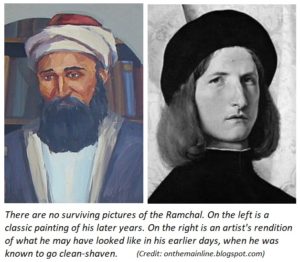Code of Jewish Law
Yosef ben Ephraim Karo (1488-1575) was born in Toledo, then in the Spanish kingdom of Castile. The infamous 1492 Spanish Expulsion of the Jews took place when he was just four years old. The family first fled to Portugal, and were then expelled from there as well in 1497. They eventually settled in Nikopolis, in the Ottoman Empire, which had opened its doors to Sephardic Jewish refugees. (The Ottoman Sultan at the time, Bayezid II, reportedly said: “They tell me that Ferdinand of Spain is a wise man, but he is a fool, for he takes his treasure and sends it all to me.”) Karo was tutored by his rabbi father and soon became a rabbi himself. He also studied under the great Rabbi Yosef Taitazak in Salonica. For a couple of years, he served as a rabbi in Adrianople, and eventually resettled in Tzfat. At the time, Tzfat was experiencing a resurgence of Jewish life and a renaissance in Jewish scholarship, thanks mainly to an influx of Sephardic Jewish refugees. It soon became the “capital” of Jewish mysticism, and Rabbi Karo was one of its most famous mystics and scholars. It was in Tzfat that he composed the Shulchan Arukh, to this day the standard code of Jewish law worldwide. (Tzfat boasted one of the first printing presses in the Middle East, helping to spread the Shulchan Arukh far and wide and making it extremely popular and accessible.) The Shulchan Arukh was itself only a summary of the far broader and more complex Beit Yosef, which was Rabbi Karo’s true magnum opus that he worked on for over twenty years. Rabbi Karo opened his own yeshiva, with 200 students including the renowned “Ramak”, Rabbi Moshe Cordovero. Karo also served as the chief rabbi on the Tzfat beit din. In fact, he was one of the main leaders in a rabbinic attempt to re-establish the ancient Sanhedrin. Rabbi Karo was recognized as the preeminent authority for all Sephardic Jewry worldwide, and was deeply respected by Ashkenazi Jews as well who, on several occasions, asked him to intervene in local European disputes. Among his other noted publications are Kesef Mishneh, a commentary on the Mishneh Torah of Maimonides, along with a textbook for Talmudic study. One of his most intriguing works is Maggid Meisharim, a personal journal which records his prophetic experiences and the teachings he received from an angel over a period of fifty years. Rabbi Karo is often referred to simply as Maran, “Our Master”.
Words of the Week
Today, what is demanded of the Jewish people is mesirut nefesh, self-sacrifice, and this is particularly true with regard to chinuch, education. The resources for which we have labored must be dedicated to the education of children – both our own, and the children of others.
– Rabbi Menachem Mendel Schneerson, the Lubavitcher Rebbe


 Moshe Chaim Luzzatto (1707-1746) was born in Padua, Italy to a wealthy Sephardic family. He studied under some of the great Italian rabbis of the time and was quickly recognized as a prodigy, receiving rabbinic ordination himself while still a teenager. He also took up studies at the University of Padua, and by the time he was just 20 years old had complete mastery of Torah, Talmud, and Kabbalah (Jewish mysticism), as well as philosophy, medicine, and alchemy. He had also written a textbook on Hebrew language and grammar, Leshon Limmudim (predating
Moshe Chaim Luzzatto (1707-1746) was born in Padua, Italy to a wealthy Sephardic family. He studied under some of the great Italian rabbis of the time and was quickly recognized as a prodigy, receiving rabbinic ordination himself while still a teenager. He also took up studies at the University of Padua, and by the time he was just 20 years old had complete mastery of Torah, Talmud, and Kabbalah (Jewish mysticism), as well as philosophy, medicine, and alchemy. He had also written a textbook on Hebrew language and grammar, Leshon Limmudim (predating 
